Holmes Institute: HI6027 Business and Corporate Law Case Study Report
VerifiedAdded on 2022/11/28
|11
|2534
|245
Report
AI Summary
This report presents a comprehensive analysis of two case studies in Business and Corporate Law, addressing key legal principles and their application. Part A examines contract law, focusing on offer and acceptance, and the enforceability of agreements, illustrated through a scenario involving a restaurant promotion and customer claims. Part B delves into corporate law, particularly the authority of a bank to provide a loan to a company, considering the roles of directors and the implications of the Corporations Act 2001 (Cth). The report explores the doctrine of indoor management and its impact on third parties dealing with a company. It also considers the impact of a director's employment status and internal company regulations on the validity of financial transactions. The analysis cites relevant legal rules, cases such as Carlill v Carbolic Smoke Ball Company, and legislation to support its conclusions, providing a detailed examination of the legal issues and their practical implications.
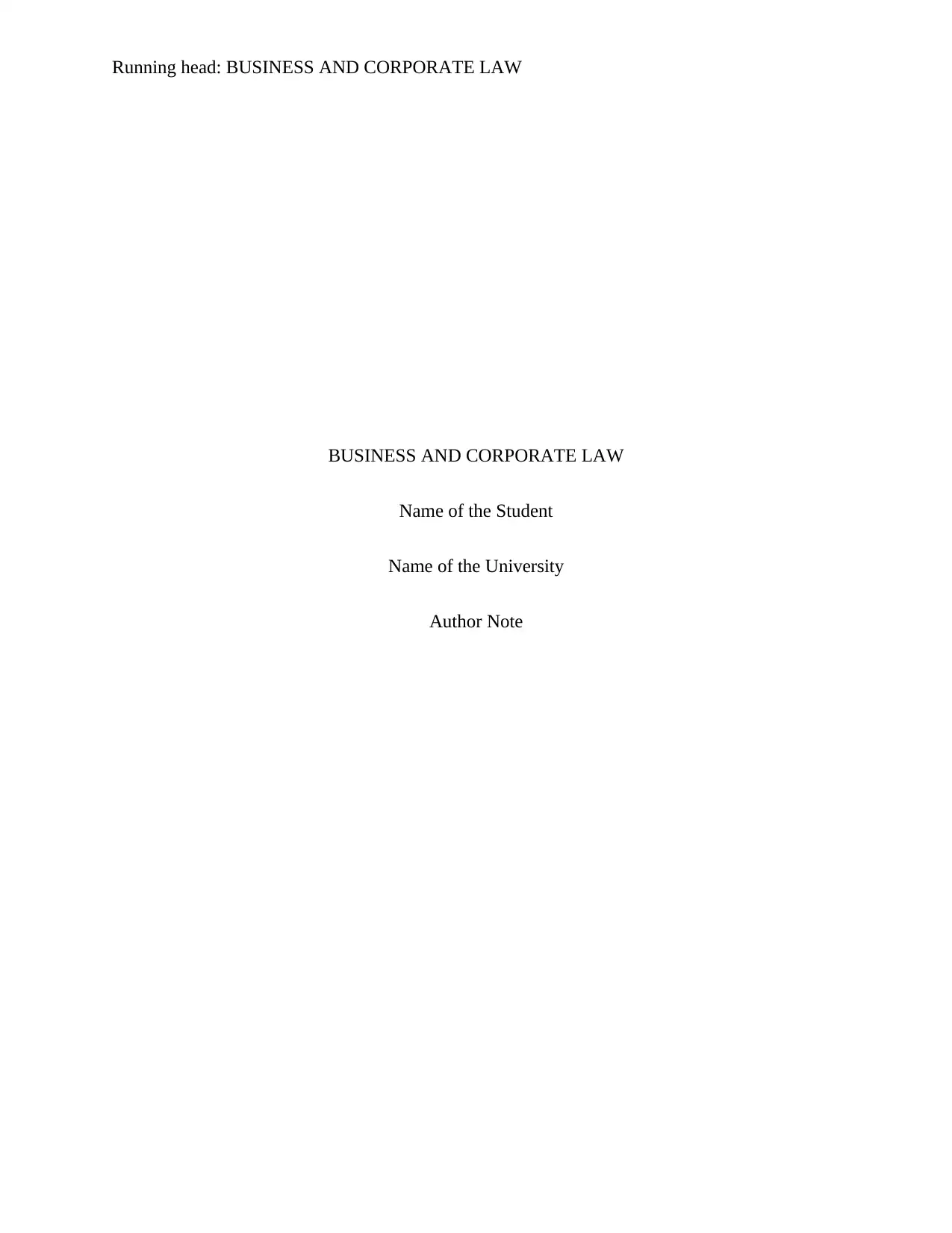
Running head: BUSINESS AND CORPORATE LAW
BUSINESS AND CORPORATE LAW
Name of the Student
Name of the University
Author Note
BUSINESS AND CORPORATE LAW
Name of the Student
Name of the University
Author Note
Paraphrase This Document
Need a fresh take? Get an instant paraphrase of this document with our AI Paraphraser
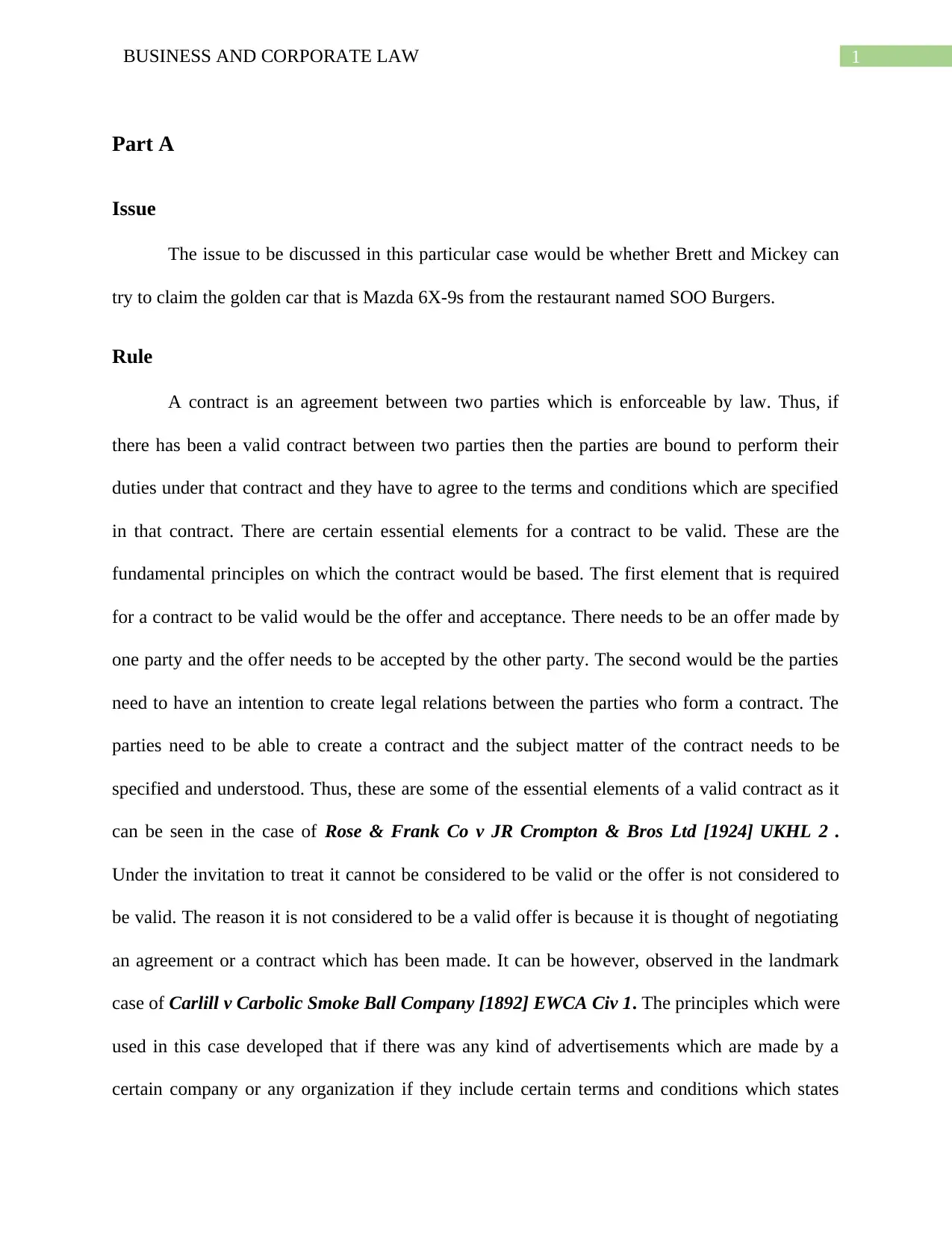
1BUSINESS AND CORPORATE LAW
Part A
Issue
The issue to be discussed in this particular case would be whether Brett and Mickey can
try to claim the golden car that is Mazda 6X-9s from the restaurant named SOO Burgers.
Rule
A contract is an agreement between two parties which is enforceable by law. Thus, if
there has been a valid contract between two parties then the parties are bound to perform their
duties under that contract and they have to agree to the terms and conditions which are specified
in that contract. There are certain essential elements for a contract to be valid. These are the
fundamental principles on which the contract would be based. The first element that is required
for a contract to be valid would be the offer and acceptance. There needs to be an offer made by
one party and the offer needs to be accepted by the other party. The second would be the parties
need to have an intention to create legal relations between the parties who form a contract. The
parties need to be able to create a contract and the subject matter of the contract needs to be
specified and understood. Thus, these are some of the essential elements of a valid contract as it
can be seen in the case of Rose & Frank Co v JR Crompton & Bros Ltd [1924] UKHL 2 .
Under the invitation to treat it cannot be considered to be valid or the offer is not considered to
be valid. The reason it is not considered to be a valid offer is because it is thought of negotiating
an agreement or a contract which has been made. It can be however, observed in the landmark
case of Carlill v Carbolic Smoke Ball Company [1892] EWCA Civ 1. The principles which were
used in this case developed that if there was any kind of advertisements which are made by a
certain company or any organization if they include certain terms and conditions which states
Part A
Issue
The issue to be discussed in this particular case would be whether Brett and Mickey can
try to claim the golden car that is Mazda 6X-9s from the restaurant named SOO Burgers.
Rule
A contract is an agreement between two parties which is enforceable by law. Thus, if
there has been a valid contract between two parties then the parties are bound to perform their
duties under that contract and they have to agree to the terms and conditions which are specified
in that contract. There are certain essential elements for a contract to be valid. These are the
fundamental principles on which the contract would be based. The first element that is required
for a contract to be valid would be the offer and acceptance. There needs to be an offer made by
one party and the offer needs to be accepted by the other party. The second would be the parties
need to have an intention to create legal relations between the parties who form a contract. The
parties need to be able to create a contract and the subject matter of the contract needs to be
specified and understood. Thus, these are some of the essential elements of a valid contract as it
can be seen in the case of Rose & Frank Co v JR Crompton & Bros Ltd [1924] UKHL 2 .
Under the invitation to treat it cannot be considered to be valid or the offer is not considered to
be valid. The reason it is not considered to be a valid offer is because it is thought of negotiating
an agreement or a contract which has been made. It can be however, observed in the landmark
case of Carlill v Carbolic Smoke Ball Company [1892] EWCA Civ 1. The principles which were
used in this case developed that if there was any kind of advertisements which are made by a
certain company or any organization if they include certain terms and conditions which states
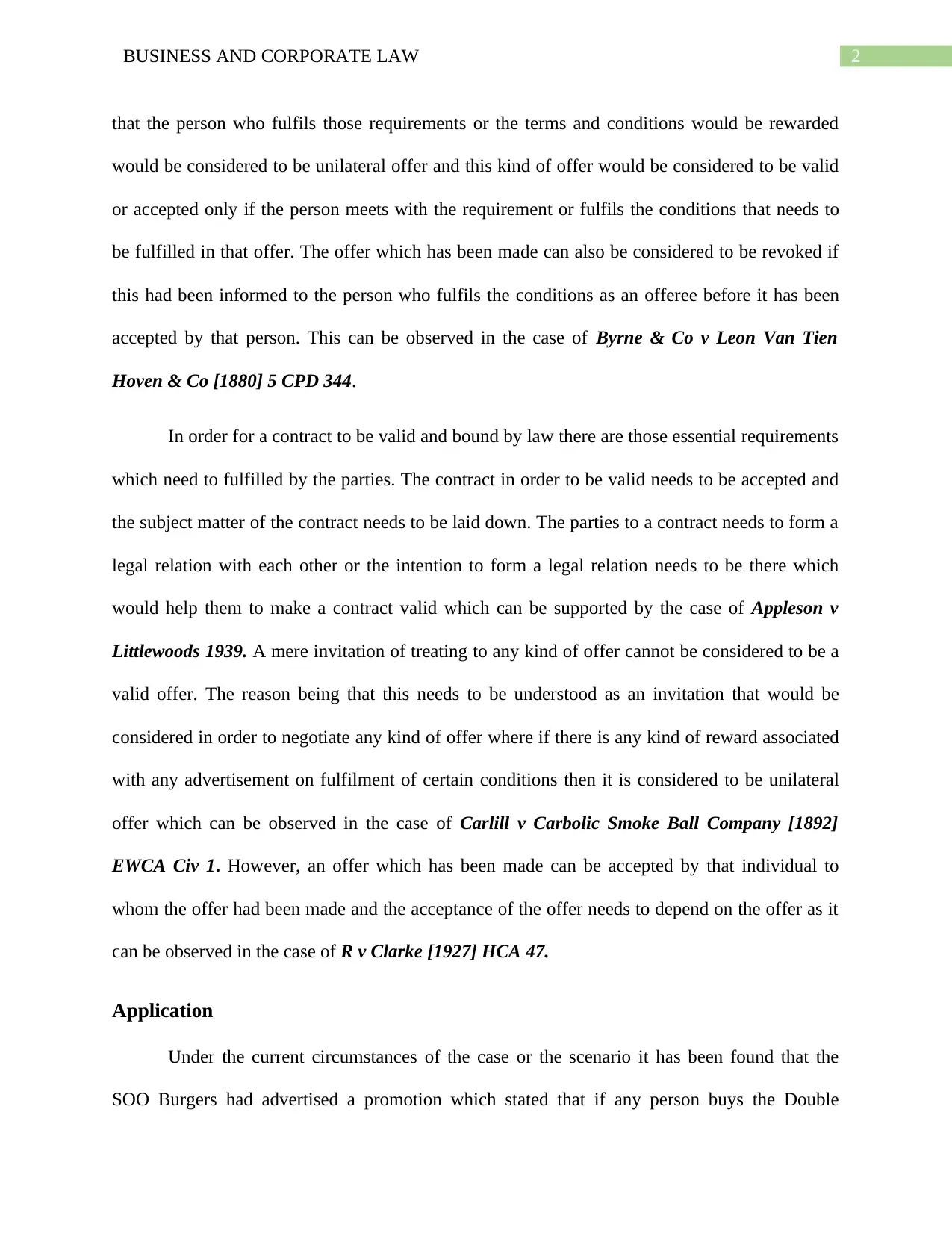
2BUSINESS AND CORPORATE LAW
that the person who fulfils those requirements or the terms and conditions would be rewarded
would be considered to be unilateral offer and this kind of offer would be considered to be valid
or accepted only if the person meets with the requirement or fulfils the conditions that needs to
be fulfilled in that offer. The offer which has been made can also be considered to be revoked if
this had been informed to the person who fulfils the conditions as an offeree before it has been
accepted by that person. This can be observed in the case of Byrne & Co v Leon Van Tien
Hoven & Co [1880] 5 CPD 344.
In order for a contract to be valid and bound by law there are those essential requirements
which need to fulfilled by the parties. The contract in order to be valid needs to be accepted and
the subject matter of the contract needs to be laid down. The parties to a contract needs to form a
legal relation with each other or the intention to form a legal relation needs to be there which
would help them to make a contract valid which can be supported by the case of Appleson v
Littlewoods 1939. A mere invitation of treating to any kind of offer cannot be considered to be a
valid offer. The reason being that this needs to be understood as an invitation that would be
considered in order to negotiate any kind of offer where if there is any kind of reward associated
with any advertisement on fulfilment of certain conditions then it is considered to be unilateral
offer which can be observed in the case of Carlill v Carbolic Smoke Ball Company [1892]
EWCA Civ 1. However, an offer which has been made can be accepted by that individual to
whom the offer had been made and the acceptance of the offer needs to depend on the offer as it
can be observed in the case of R v Clarke [1927] HCA 47.
Application
Under the current circumstances of the case or the scenario it has been found that the
SOO Burgers had advertised a promotion which stated that if any person buys the Double
that the person who fulfils those requirements or the terms and conditions would be rewarded
would be considered to be unilateral offer and this kind of offer would be considered to be valid
or accepted only if the person meets with the requirement or fulfils the conditions that needs to
be fulfilled in that offer. The offer which has been made can also be considered to be revoked if
this had been informed to the person who fulfils the conditions as an offeree before it has been
accepted by that person. This can be observed in the case of Byrne & Co v Leon Van Tien
Hoven & Co [1880] 5 CPD 344.
In order for a contract to be valid and bound by law there are those essential requirements
which need to fulfilled by the parties. The contract in order to be valid needs to be accepted and
the subject matter of the contract needs to be laid down. The parties to a contract needs to form a
legal relation with each other or the intention to form a legal relation needs to be there which
would help them to make a contract valid which can be supported by the case of Appleson v
Littlewoods 1939. A mere invitation of treating to any kind of offer cannot be considered to be a
valid offer. The reason being that this needs to be understood as an invitation that would be
considered in order to negotiate any kind of offer where if there is any kind of reward associated
with any advertisement on fulfilment of certain conditions then it is considered to be unilateral
offer which can be observed in the case of Carlill v Carbolic Smoke Ball Company [1892]
EWCA Civ 1. However, an offer which has been made can be accepted by that individual to
whom the offer had been made and the acceptance of the offer needs to depend on the offer as it
can be observed in the case of R v Clarke [1927] HCA 47.
Application
Under the current circumstances of the case or the scenario it has been found that the
SOO Burgers had advertised a promotion which stated that if any person buys the Double
⊘ This is a preview!⊘
Do you want full access?
Subscribe today to unlock all pages.

Trusted by 1+ million students worldwide
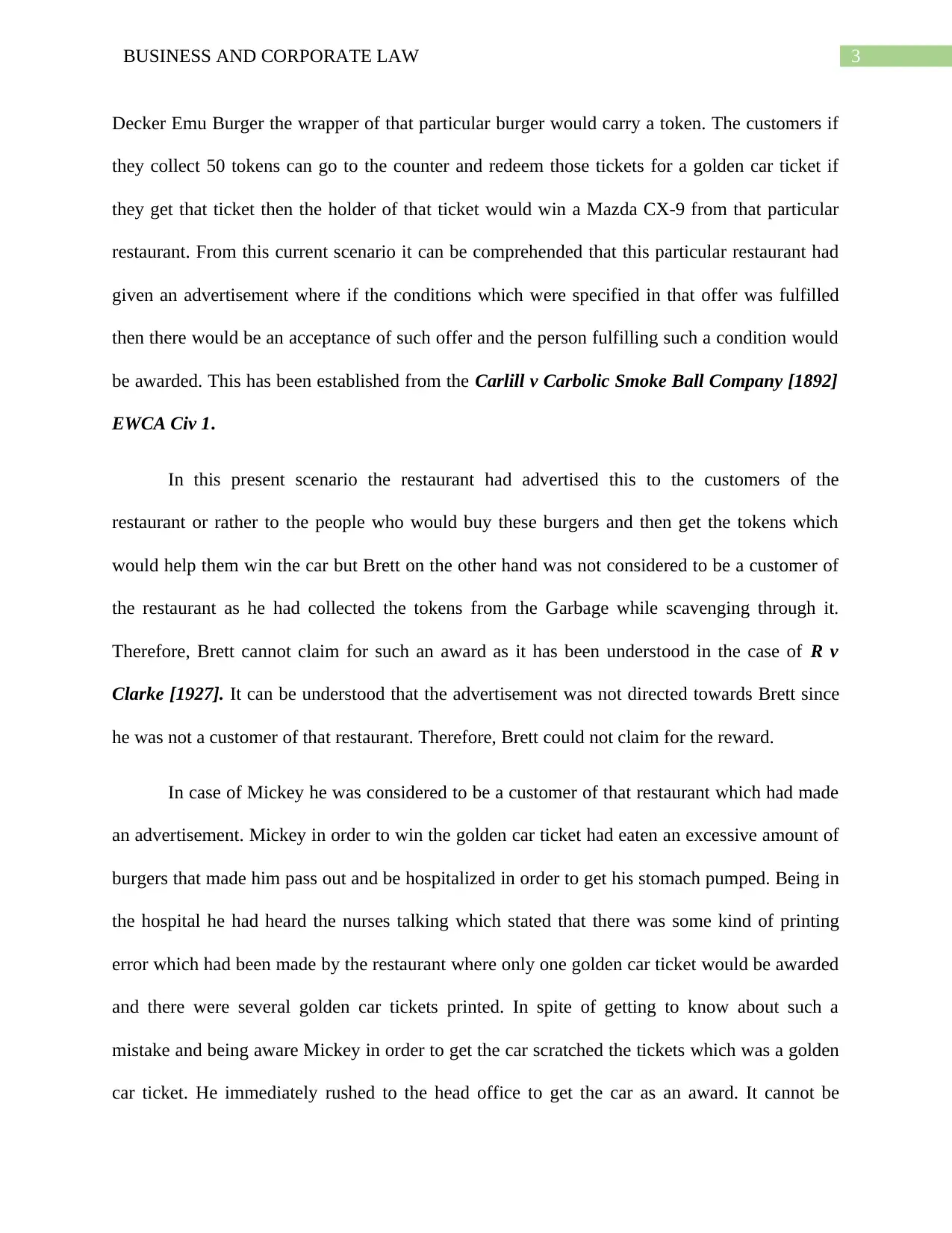
3BUSINESS AND CORPORATE LAW
Decker Emu Burger the wrapper of that particular burger would carry a token. The customers if
they collect 50 tokens can go to the counter and redeem those tickets for a golden car ticket if
they get that ticket then the holder of that ticket would win a Mazda CX-9 from that particular
restaurant. From this current scenario it can be comprehended that this particular restaurant had
given an advertisement where if the conditions which were specified in that offer was fulfilled
then there would be an acceptance of such offer and the person fulfilling such a condition would
be awarded. This has been established from the Carlill v Carbolic Smoke Ball Company [1892]
EWCA Civ 1.
In this present scenario the restaurant had advertised this to the customers of the
restaurant or rather to the people who would buy these burgers and then get the tokens which
would help them win the car but Brett on the other hand was not considered to be a customer of
the restaurant as he had collected the tokens from the Garbage while scavenging through it.
Therefore, Brett cannot claim for such an award as it has been understood in the case of R v
Clarke [1927]. It can be understood that the advertisement was not directed towards Brett since
he was not a customer of that restaurant. Therefore, Brett could not claim for the reward.
In case of Mickey he was considered to be a customer of that restaurant which had made
an advertisement. Mickey in order to win the golden car ticket had eaten an excessive amount of
burgers that made him pass out and be hospitalized in order to get his stomach pumped. Being in
the hospital he had heard the nurses talking which stated that there was some kind of printing
error which had been made by the restaurant where only one golden car ticket would be awarded
and there were several golden car tickets printed. In spite of getting to know about such a
mistake and being aware Mickey in order to get the car scratched the tickets which was a golden
car ticket. He immediately rushed to the head office to get the car as an award. It cannot be
Decker Emu Burger the wrapper of that particular burger would carry a token. The customers if
they collect 50 tokens can go to the counter and redeem those tickets for a golden car ticket if
they get that ticket then the holder of that ticket would win a Mazda CX-9 from that particular
restaurant. From this current scenario it can be comprehended that this particular restaurant had
given an advertisement where if the conditions which were specified in that offer was fulfilled
then there would be an acceptance of such offer and the person fulfilling such a condition would
be awarded. This has been established from the Carlill v Carbolic Smoke Ball Company [1892]
EWCA Civ 1.
In this present scenario the restaurant had advertised this to the customers of the
restaurant or rather to the people who would buy these burgers and then get the tokens which
would help them win the car but Brett on the other hand was not considered to be a customer of
the restaurant as he had collected the tokens from the Garbage while scavenging through it.
Therefore, Brett cannot claim for such an award as it has been understood in the case of R v
Clarke [1927]. It can be understood that the advertisement was not directed towards Brett since
he was not a customer of that restaurant. Therefore, Brett could not claim for the reward.
In case of Mickey he was considered to be a customer of that restaurant which had made
an advertisement. Mickey in order to win the golden car ticket had eaten an excessive amount of
burgers that made him pass out and be hospitalized in order to get his stomach pumped. Being in
the hospital he had heard the nurses talking which stated that there was some kind of printing
error which had been made by the restaurant where only one golden car ticket would be awarded
and there were several golden car tickets printed. In spite of getting to know about such a
mistake and being aware Mickey in order to get the car scratched the tickets which was a golden
car ticket. He immediately rushed to the head office to get the car as an award. It cannot be
Paraphrase This Document
Need a fresh take? Get an instant paraphrase of this document with our AI Paraphraser
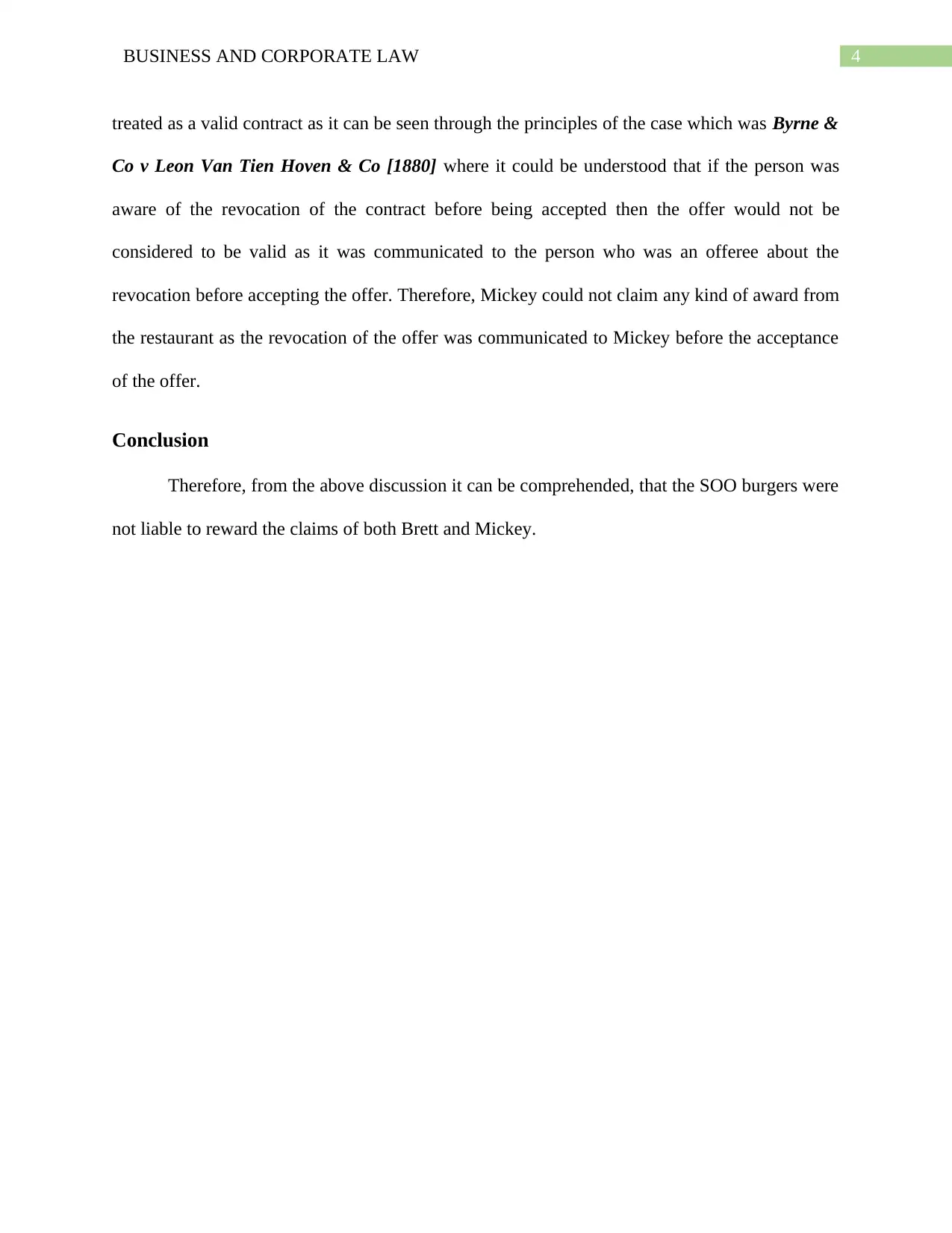
4BUSINESS AND CORPORATE LAW
treated as a valid contract as it can be seen through the principles of the case which was Byrne &
Co v Leon Van Tien Hoven & Co [1880] where it could be understood that if the person was
aware of the revocation of the contract before being accepted then the offer would not be
considered to be valid as it was communicated to the person who was an offeree about the
revocation before accepting the offer. Therefore, Mickey could not claim any kind of award from
the restaurant as the revocation of the offer was communicated to Mickey before the acceptance
of the offer.
Conclusion
Therefore, from the above discussion it can be comprehended, that the SOO burgers were
not liable to reward the claims of both Brett and Mickey.
treated as a valid contract as it can be seen through the principles of the case which was Byrne &
Co v Leon Van Tien Hoven & Co [1880] where it could be understood that if the person was
aware of the revocation of the contract before being accepted then the offer would not be
considered to be valid as it was communicated to the person who was an offeree about the
revocation before accepting the offer. Therefore, Mickey could not claim any kind of award from
the restaurant as the revocation of the offer was communicated to Mickey before the acceptance
of the offer.
Conclusion
Therefore, from the above discussion it can be comprehended, that the SOO burgers were
not liable to reward the claims of both Brett and Mickey.
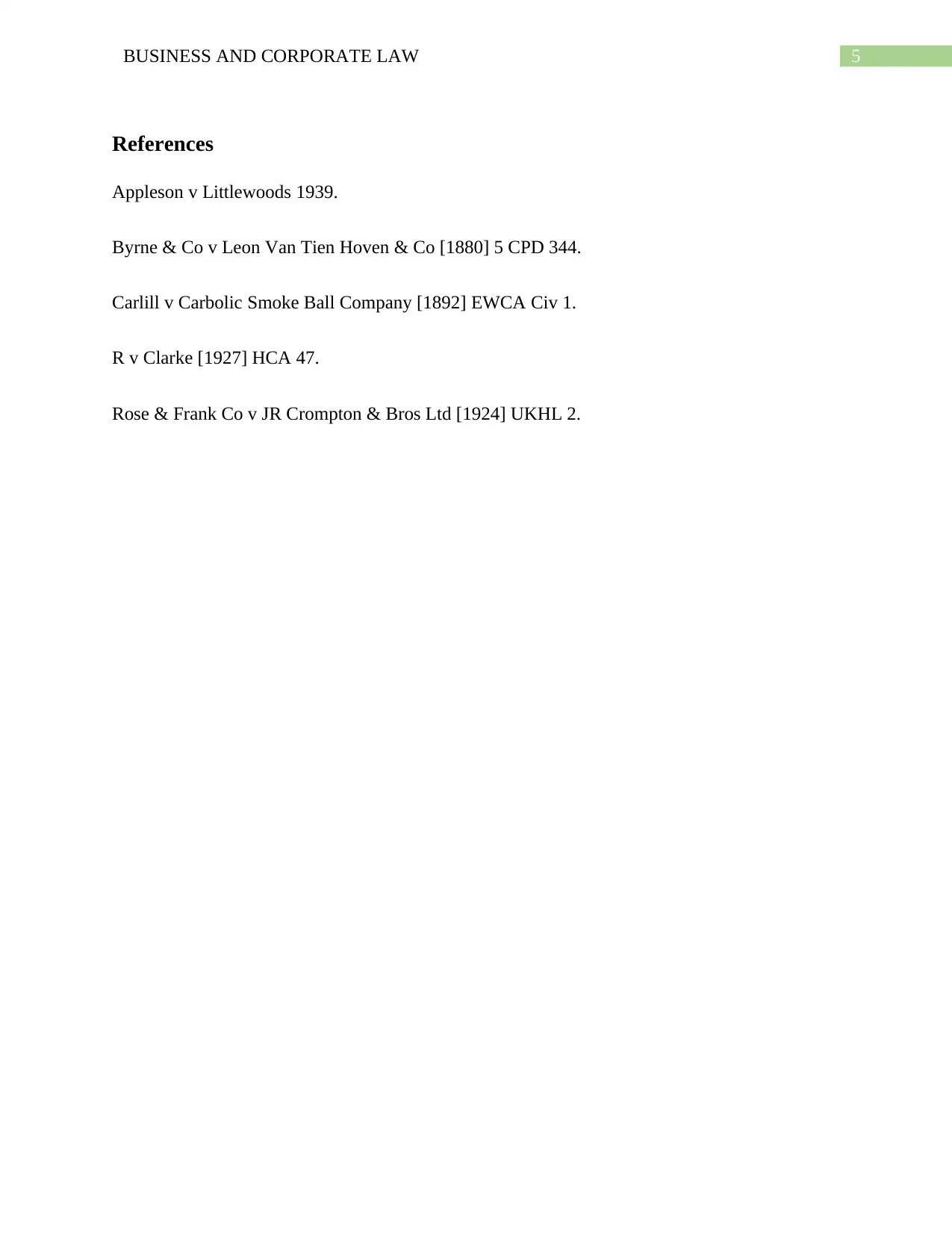
5BUSINESS AND CORPORATE LAW
References
Appleson v Littlewoods 1939.
Byrne & Co v Leon Van Tien Hoven & Co [1880] 5 CPD 344.
Carlill v Carbolic Smoke Ball Company [1892] EWCA Civ 1.
R v Clarke [1927] HCA 47.
Rose & Frank Co v JR Crompton & Bros Ltd [1924] UKHL 2.
References
Appleson v Littlewoods 1939.
Byrne & Co v Leon Van Tien Hoven & Co [1880] 5 CPD 344.
Carlill v Carbolic Smoke Ball Company [1892] EWCA Civ 1.
R v Clarke [1927] HCA 47.
Rose & Frank Co v JR Crompton & Bros Ltd [1924] UKHL 2.
⊘ This is a preview!⊘
Do you want full access?
Subscribe today to unlock all pages.

Trusted by 1+ million students worldwide
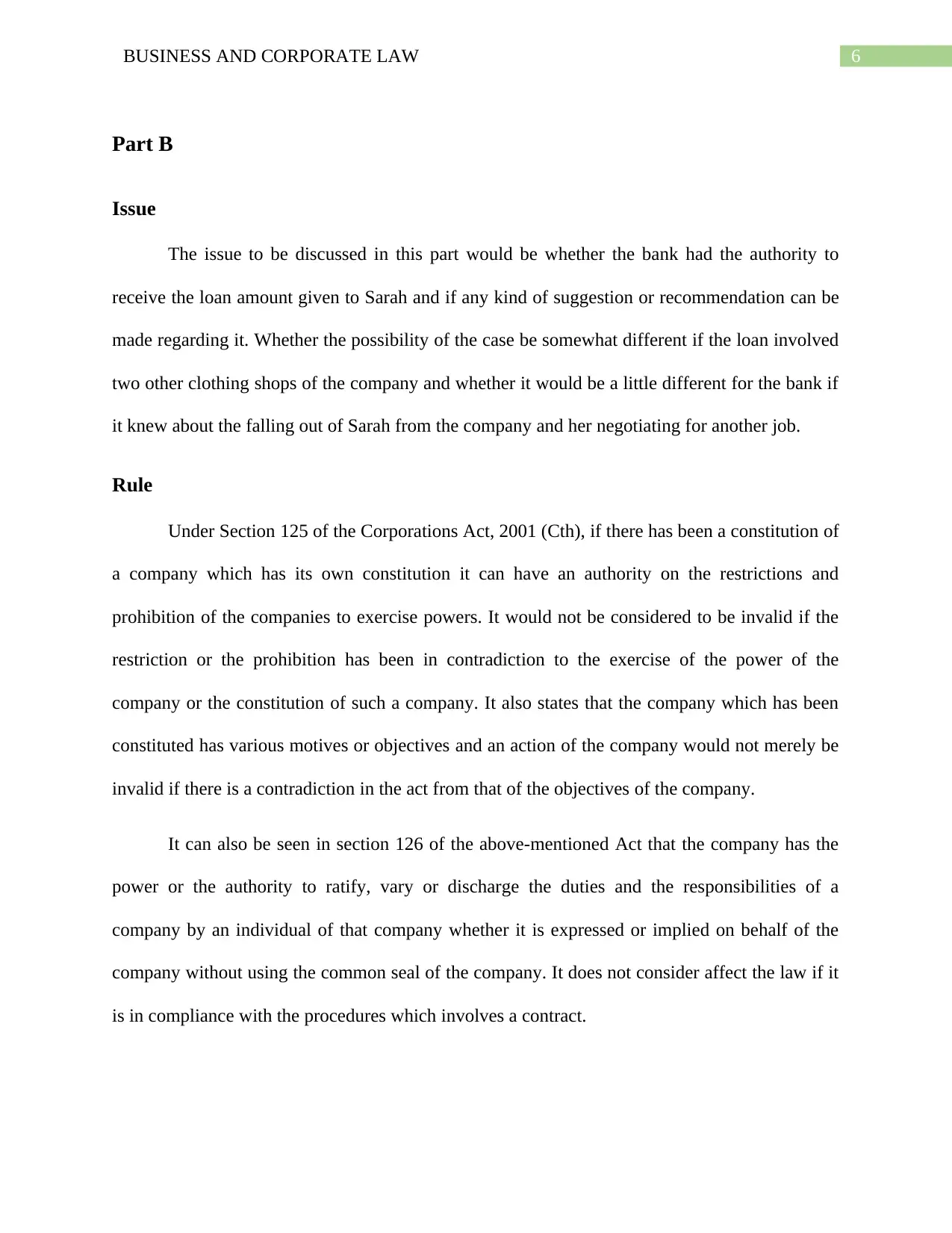
6BUSINESS AND CORPORATE LAW
Part B
Issue
The issue to be discussed in this part would be whether the bank had the authority to
receive the loan amount given to Sarah and if any kind of suggestion or recommendation can be
made regarding it. Whether the possibility of the case be somewhat different if the loan involved
two other clothing shops of the company and whether it would be a little different for the bank if
it knew about the falling out of Sarah from the company and her negotiating for another job.
Rule
Under Section 125 of the Corporations Act, 2001 (Cth), if there has been a constitution of
a company which has its own constitution it can have an authority on the restrictions and
prohibition of the companies to exercise powers. It would not be considered to be invalid if the
restriction or the prohibition has been in contradiction to the exercise of the power of the
company or the constitution of such a company. It also states that the company which has been
constituted has various motives or objectives and an action of the company would not merely be
invalid if there is a contradiction in the act from that of the objectives of the company.
It can also be seen in section 126 of the above-mentioned Act that the company has the
power or the authority to ratify, vary or discharge the duties and the responsibilities of a
company by an individual of that company whether it is expressed or implied on behalf of the
company without using the common seal of the company. It does not consider affect the law if it
is in compliance with the procedures which involves a contract.
Part B
Issue
The issue to be discussed in this part would be whether the bank had the authority to
receive the loan amount given to Sarah and if any kind of suggestion or recommendation can be
made regarding it. Whether the possibility of the case be somewhat different if the loan involved
two other clothing shops of the company and whether it would be a little different for the bank if
it knew about the falling out of Sarah from the company and her negotiating for another job.
Rule
Under Section 125 of the Corporations Act, 2001 (Cth), if there has been a constitution of
a company which has its own constitution it can have an authority on the restrictions and
prohibition of the companies to exercise powers. It would not be considered to be invalid if the
restriction or the prohibition has been in contradiction to the exercise of the power of the
company or the constitution of such a company. It also states that the company which has been
constituted has various motives or objectives and an action of the company would not merely be
invalid if there is a contradiction in the act from that of the objectives of the company.
It can also be seen in section 126 of the above-mentioned Act that the company has the
power or the authority to ratify, vary or discharge the duties and the responsibilities of a
company by an individual of that company whether it is expressed or implied on behalf of the
company without using the common seal of the company. It does not consider affect the law if it
is in compliance with the procedures which involves a contract.
Paraphrase This Document
Need a fresh take? Get an instant paraphrase of this document with our AI Paraphraser
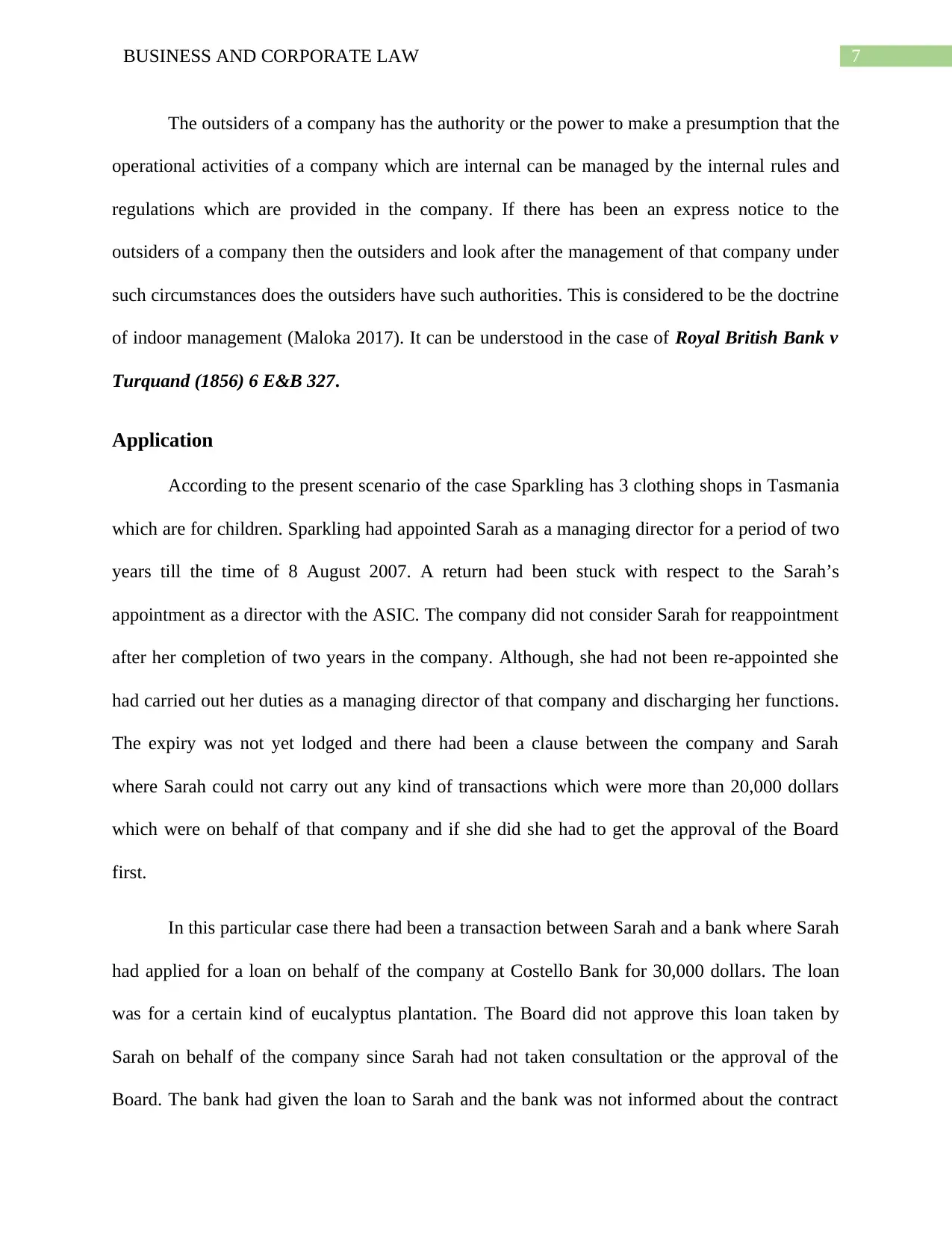
7BUSINESS AND CORPORATE LAW
The outsiders of a company has the authority or the power to make a presumption that the
operational activities of a company which are internal can be managed by the internal rules and
regulations which are provided in the company. If there has been an express notice to the
outsiders of a company then the outsiders and look after the management of that company under
such circumstances does the outsiders have such authorities. This is considered to be the doctrine
of indoor management (Maloka 2017). It can be understood in the case of Royal British Bank v
Turquand (1856) 6 E&B 327.
Application
According to the present scenario of the case Sparkling has 3 clothing shops in Tasmania
which are for children. Sparkling had appointed Sarah as a managing director for a period of two
years till the time of 8 August 2007. A return had been stuck with respect to the Sarah’s
appointment as a director with the ASIC. The company did not consider Sarah for reappointment
after her completion of two years in the company. Although, she had not been re-appointed she
had carried out her duties as a managing director of that company and discharging her functions.
The expiry was not yet lodged and there had been a clause between the company and Sarah
where Sarah could not carry out any kind of transactions which were more than 20,000 dollars
which were on behalf of that company and if she did she had to get the approval of the Board
first.
In this particular case there had been a transaction between Sarah and a bank where Sarah
had applied for a loan on behalf of the company at Costello Bank for 30,000 dollars. The loan
was for a certain kind of eucalyptus plantation. The Board did not approve this loan taken by
Sarah on behalf of the company since Sarah had not taken consultation or the approval of the
Board. The bank had given the loan to Sarah and the bank was not informed about the contract
The outsiders of a company has the authority or the power to make a presumption that the
operational activities of a company which are internal can be managed by the internal rules and
regulations which are provided in the company. If there has been an express notice to the
outsiders of a company then the outsiders and look after the management of that company under
such circumstances does the outsiders have such authorities. This is considered to be the doctrine
of indoor management (Maloka 2017). It can be understood in the case of Royal British Bank v
Turquand (1856) 6 E&B 327.
Application
According to the present scenario of the case Sparkling has 3 clothing shops in Tasmania
which are for children. Sparkling had appointed Sarah as a managing director for a period of two
years till the time of 8 August 2007. A return had been stuck with respect to the Sarah’s
appointment as a director with the ASIC. The company did not consider Sarah for reappointment
after her completion of two years in the company. Although, she had not been re-appointed she
had carried out her duties as a managing director of that company and discharging her functions.
The expiry was not yet lodged and there had been a clause between the company and Sarah
where Sarah could not carry out any kind of transactions which were more than 20,000 dollars
which were on behalf of that company and if she did she had to get the approval of the Board
first.
In this particular case there had been a transaction between Sarah and a bank where Sarah
had applied for a loan on behalf of the company at Costello Bank for 30,000 dollars. The loan
was for a certain kind of eucalyptus plantation. The Board did not approve this loan taken by
Sarah on behalf of the company since Sarah had not taken consultation or the approval of the
Board. The bank had given the loan to Sarah and the bank was not informed about the contract
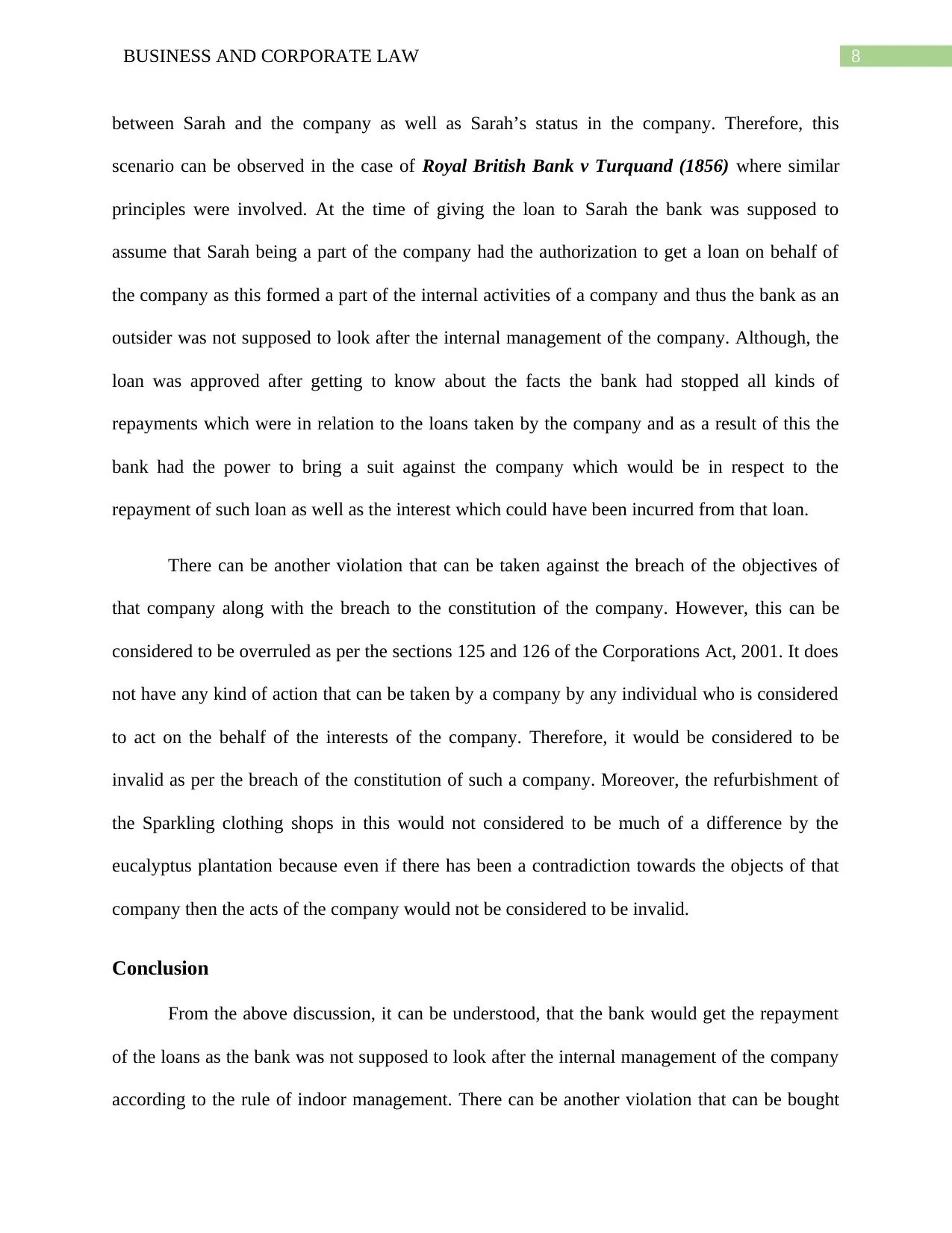
8BUSINESS AND CORPORATE LAW
between Sarah and the company as well as Sarah’s status in the company. Therefore, this
scenario can be observed in the case of Royal British Bank v Turquand (1856) where similar
principles were involved. At the time of giving the loan to Sarah the bank was supposed to
assume that Sarah being a part of the company had the authorization to get a loan on behalf of
the company as this formed a part of the internal activities of a company and thus the bank as an
outsider was not supposed to look after the internal management of the company. Although, the
loan was approved after getting to know about the facts the bank had stopped all kinds of
repayments which were in relation to the loans taken by the company and as a result of this the
bank had the power to bring a suit against the company which would be in respect to the
repayment of such loan as well as the interest which could have been incurred from that loan.
There can be another violation that can be taken against the breach of the objectives of
that company along with the breach to the constitution of the company. However, this can be
considered to be overruled as per the sections 125 and 126 of the Corporations Act, 2001. It does
not have any kind of action that can be taken by a company by any individual who is considered
to act on the behalf of the interests of the company. Therefore, it would be considered to be
invalid as per the breach of the constitution of such a company. Moreover, the refurbishment of
the Sparkling clothing shops in this would not considered to be much of a difference by the
eucalyptus plantation because even if there has been a contradiction towards the objects of that
company then the acts of the company would not be considered to be invalid.
Conclusion
From the above discussion, it can be understood, that the bank would get the repayment
of the loans as the bank was not supposed to look after the internal management of the company
according to the rule of indoor management. There can be another violation that can be bought
between Sarah and the company as well as Sarah’s status in the company. Therefore, this
scenario can be observed in the case of Royal British Bank v Turquand (1856) where similar
principles were involved. At the time of giving the loan to Sarah the bank was supposed to
assume that Sarah being a part of the company had the authorization to get a loan on behalf of
the company as this formed a part of the internal activities of a company and thus the bank as an
outsider was not supposed to look after the internal management of the company. Although, the
loan was approved after getting to know about the facts the bank had stopped all kinds of
repayments which were in relation to the loans taken by the company and as a result of this the
bank had the power to bring a suit against the company which would be in respect to the
repayment of such loan as well as the interest which could have been incurred from that loan.
There can be another violation that can be taken against the breach of the objectives of
that company along with the breach to the constitution of the company. However, this can be
considered to be overruled as per the sections 125 and 126 of the Corporations Act, 2001. It does
not have any kind of action that can be taken by a company by any individual who is considered
to act on the behalf of the interests of the company. Therefore, it would be considered to be
invalid as per the breach of the constitution of such a company. Moreover, the refurbishment of
the Sparkling clothing shops in this would not considered to be much of a difference by the
eucalyptus plantation because even if there has been a contradiction towards the objects of that
company then the acts of the company would not be considered to be invalid.
Conclusion
From the above discussion, it can be understood, that the bank would get the repayment
of the loans as the bank was not supposed to look after the internal management of the company
according to the rule of indoor management. There can be another violation that can be bought
⊘ This is a preview!⊘
Do you want full access?
Subscribe today to unlock all pages.

Trusted by 1+ million students worldwide
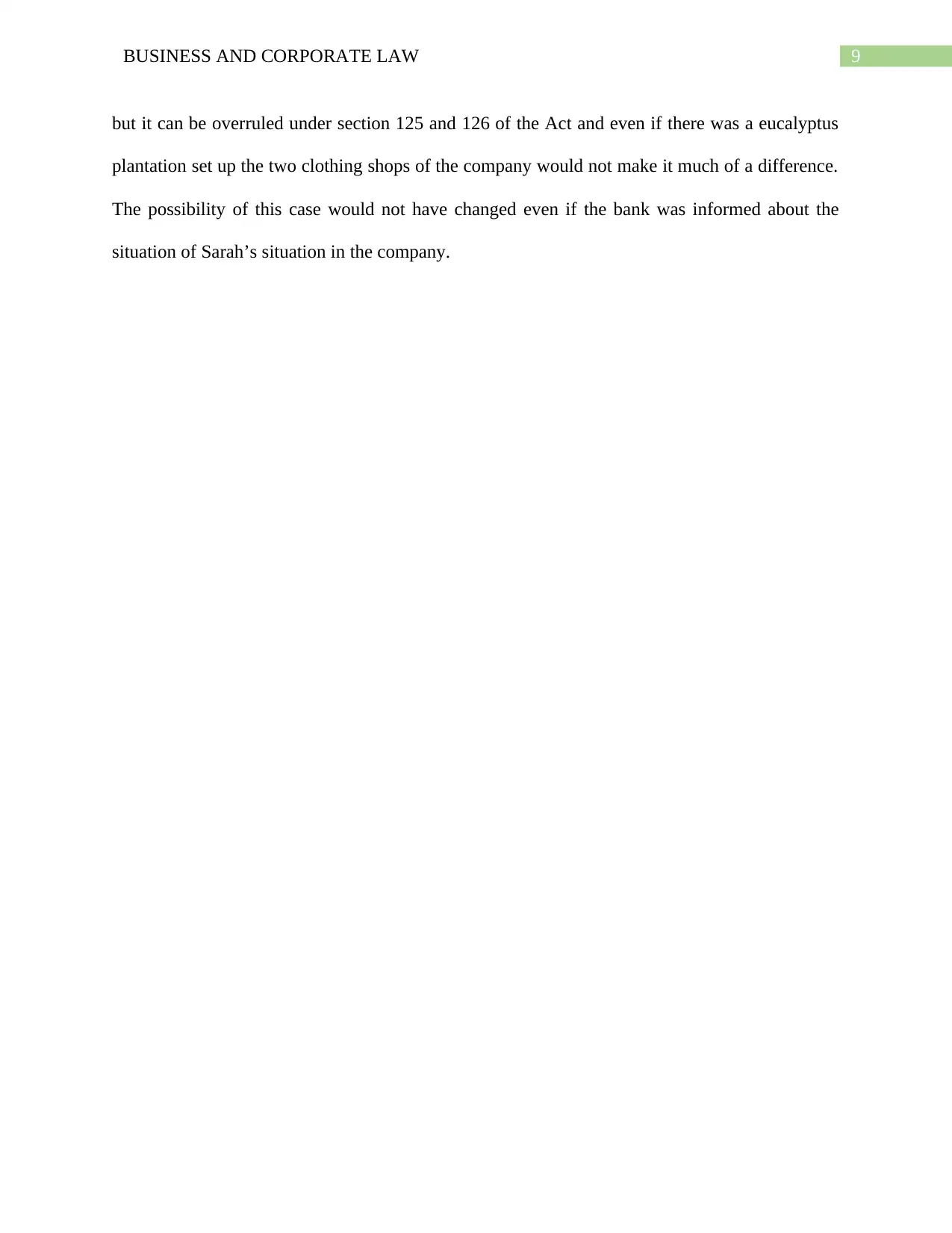
9BUSINESS AND CORPORATE LAW
but it can be overruled under section 125 and 126 of the Act and even if there was a eucalyptus
plantation set up the two clothing shops of the company would not make it much of a difference.
The possibility of this case would not have changed even if the bank was informed about the
situation of Sarah’s situation in the company.
but it can be overruled under section 125 and 126 of the Act and even if there was a eucalyptus
plantation set up the two clothing shops of the company would not make it much of a difference.
The possibility of this case would not have changed even if the bank was informed about the
situation of Sarah’s situation in the company.
Paraphrase This Document
Need a fresh take? Get an instant paraphrase of this document with our AI Paraphraser
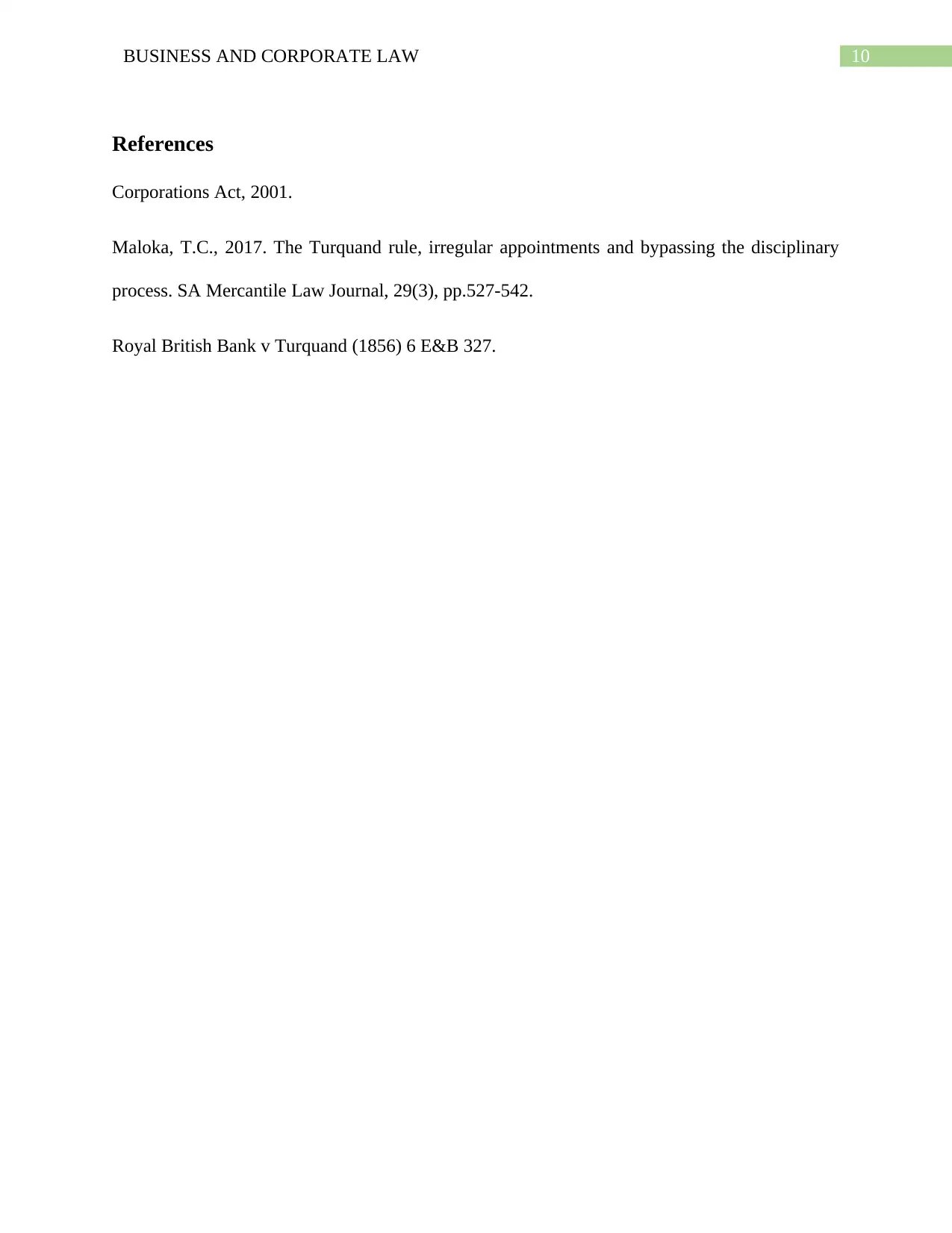
10BUSINESS AND CORPORATE LAW
References
Corporations Act, 2001.
Maloka, T.C., 2017. The Turquand rule, irregular appointments and bypassing the disciplinary
process. SA Mercantile Law Journal, 29(3), pp.527-542.
Royal British Bank v Turquand (1856) 6 E&B 327.
References
Corporations Act, 2001.
Maloka, T.C., 2017. The Turquand rule, irregular appointments and bypassing the disciplinary
process. SA Mercantile Law Journal, 29(3), pp.527-542.
Royal British Bank v Turquand (1856) 6 E&B 327.
1 out of 11
Related Documents
Your All-in-One AI-Powered Toolkit for Academic Success.
+13062052269
info@desklib.com
Available 24*7 on WhatsApp / Email
![[object Object]](/_next/static/media/star-bottom.7253800d.svg)
Unlock your academic potential
Copyright © 2020–2026 A2Z Services. All Rights Reserved. Developed and managed by ZUCOL.





